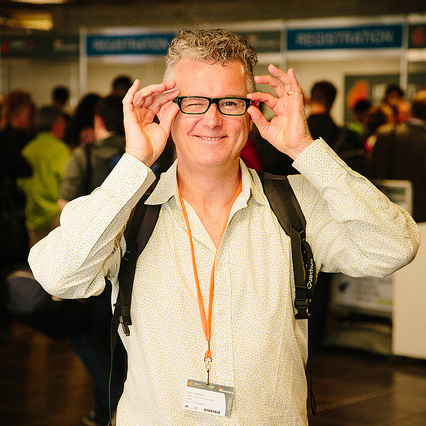The Urban Agenda for the EU: Inside the Jobs and Skills Partnership
Edited on
27 April 2017For a minute, imagine that you will start elementary school in September 2017. By the time you leave full time education, most likely it will be around 2034, assuming you go to university. So you might find your first full time job – if you’re lucky – by 2035. Then you may be in the labour market until around 2080, if current projections are correct.

Can you imagine what the world of work will look like in 2080? From the viewpoint of 2017 it is as far ahead in the future as 1954 was in the past. It is hard to begin to describe changes in the work environment since then; the shift away from manual labour, the impact of technology, reshaped organisational structures. The use of ICT in the workplace –affecting only a handful of occupations a few decades ago – is now required in all but two occupations in the United States: dishwashing and food cooking. Similarly, in most OECD countries, over 95% of workers in large businesses and 85% in medium-sized businesses have access to and use the Internet as part of their jobs. In small businesses the share is at least 65%. The world of work has been transformed.
And, of course, time moves faster now. Increasingly, we live in dog years, where every new year contains seven old year’s worth of development. Consequently, the pace of transformation in the coming decades is likely to be even more significant than we have had before. Recent research estimated that 65% of those children entering primary school today will end up working in totally new job types that don’t yet exist.
What does this mean for the jobs and skills agenda in Europe? What assumptions should we make as we try to anticipate the best way to prepare people – of all ages – for this brave new world? What infrastructure and services do we need to ensure that we have the right framework for sustainable growth? And what is the evolving role of local authorities and public services in this new dynamic environment?
These key questions are at the heart of the Urban Agenda for the EU’s Jobs and Skills Partnership, which started in January 2017, and which will run until late 2018. In this article, we will explore the partnership’s remit and examine its plans, which sit alongside the other partnerships already in play, with others coming on stream shortly. We will also investigate the potential URBACT contribution to this partnership’s work, focusing on the programme networks and capitalisation activity that focuses on this important policy sphere. Finally, we’ll consider how people can get involved.
The UAEU Jobs and Skills in Local Development Partnership
So…what’s the plan?
 The overall objective of the Urban Agenda for the EU is to involve urban authorities and their partners in achieving Better Regulation, Better Funding and Better Knowledge, to realise the full potential of the European Union in urban areas. There are currently eight partnerships exploring a range of policy-priorities, with another four coming on stream shortly.
The overall objective of the Urban Agenda for the EU is to involve urban authorities and their partners in achieving Better Regulation, Better Funding and Better Knowledge, to realise the full potential of the European Union in urban areas. There are currently eight partnerships exploring a range of policy-priorities, with another four coming on stream shortly.
For the Jobs and Skills partnership, the focus is increasing workforce capacity, creating jobs and improving local economic development preconditions.
The Partnership will analyze and identify bottlenecks and burdens at EU, national and local level. The aim is to present concrete proposals for improving the existing EU legislation, funding and knowledge framework to provide more favourable conditions for local economies and labour markets.
The partnership is led by Romania, with support from Rotterdam and Jelgava. In the coming eighteen months, the partnership will produce a series of outputs, designed to address its aims. The final one will be an Action Plan, scheduled for early 2018.
The working group has started its activities by producing an orientation paper setting out the context of their work and identifying the focus and priorities for its programme in the coming months. The schedule of activities is as follows:
- Stocktake: summer 2017
- Research: completed winter 2017
- Action planning: winter 2017/18
- Stakeholder consultation: spring 2018
- Final Action Plan: autumn 2018
Priorities and work packages
Following initial exchange and consultation, informed by EU, national and urban priorities, the Partnership identified the following priority themes to help structure its activities:
- Valorisation of R&D – working with entrepreneurs and the research community to commercialise the results of scientific research and development
- Business locations – Ensuring we have a 21st century business infrastructure which comprises commercial locations, effective utilities logistics and support services
- Public services – supporting effective public services to support sustainable growth and provide the best conditions for business – including a key brokerage role between citizens, government and business
- Effective local government – promoting skills development, job creation, economic growth through a range of services including labour market forecasting, inward investment and support for marginalised labour market groups
- Next Economy – supporting cities to make the transition to the Fourth Industrial Age based on knowledge, sustainable energy, the Internet of Things and more localised and circular forms of production.
- Education and Skills – ensuring that cities are developing the labour force for the future, with an emphasis on supporting higher productivity, creativity and innovation, whilst ensuring inclusive labour markets.
To manage this ambitious and wide-ranging agenda, the leading partnership members have each committed to leading on two of these themes, as follows:

The Partnership’s orientation paper provides further details of its scope and plans. Their work – at a critical point when Europe’s economic recovery remains uneven and fragile – can help inform the future use of EU funds linked to the jobs and skills agenda. As we head towards the new programming period, the partnership has a real opportunity to shape how these significant budgets can be utilised to greater effect in urban areas.
URBACT’s contribution to the Partnership’s work
How can URBACT contribute to this work? Also, how can URBACT support cities across Europe to have a voice and play a role in these important developments?
URBACT is in the business of combining policy with practice. The programme already works with 300+ cities in the new programming period, with new networks coming on stream in early 2018. The focus is firmly on building cities’ capacity for integrated and sustainable urban development. Increasingly, the growth and retention of talent is a key barometer of cities’ success, so it is no surprise that jobs and skills occupies a central position in the programme’s work.
At programme level, URBACT has examined the changing EU context for cities in relation to jobs and skills. This work has drawn on cities’ experience and has been informed by good practice across Europe. Showcased in the programme’s capitalisation series, the key content has included:
- More Jobs, Better Cities– this workstream investigated the levers available at the local level enabling cities to influence and shape their labour markets. Including good practice examples from Gävle, Barnsley and Albacete, it sets out a framework for city action on jobs
- New Urban Economies– the focus here was on the sectors of tomorrow and the new behavioural models that are shaping economic growth across Europe’s cities. With a strong emphasis on the quadruple helix model, it included case studies from San Sebastian, Dublin and Heidelberg.
- Job Generation for a Jobless Generation tackled the ongoing priority of youth employment – looking at the demand and supply sides to identify practical steps cities can take to generate opportunities. The workstream drew upon the expert views of Eurocities, CEDEFOP and the OECD, as well as URBACT, and includes case studies from Thessaloniki and Leeds
- Supporting Urban Youth through Social Innovation examined new ways to build connections and nurture the talent of young people through social innovation. Including case studies from Copenhagen, Rotterdam and Riga, it underlined the growing importance of city authorities’ brokerage role and the value of supporting youth to design and shape interventions
Each of these workstreams – which generated a range of written and video outputs – helps describe the changes cities are dealing with, providing practical examples to inspire and educate peers. They provide good insights into how cities are making best use of existing resources to boost skills and employment.
 The workstreams drew much of their content from URBACT’s networks, which bring cities together to collaborate on tackling shared problems. This now includes Implementation Networks, where cities address shared challenges beyond the action planning stage. In early 2018 these will be joined by the Transfer Networks, which will provide a platform for the sharing and transfer of good practices.
The workstreams drew much of their content from URBACT’s networks, which bring cities together to collaborate on tackling shared problems. This now includes Implementation Networks, where cities address shared challenges beyond the action planning stage. In early 2018 these will be joined by the Transfer Networks, which will provide a platform for the sharing and transfer of good practices.
Related to the structure of the Jobs and Skills Partnership workplan, URBACT has a wide range of completed and ongoing projects that can provide useful insights and lessons.
In relation to the issues of public services and local government support, this strand runs through many URBACT projects. Building the capacity of city authorities remains core business and there has been a growing emphasis on the key role of cities as intermediaries and trusted facilitators.
For example, from the Sustainable Food network, Amersfoort developed its strong brokerage model where the local authority staff were described by Lucas Bols, the Mayor, as ‘Free range civil servants.’ This envisages their role as being community catalysts, connecting people, ideas and opportunities.
Amongst the current networks, BOOSTINO places the local authority brokerage function as having growing significance. For example, the city of Torino is leading a range of innovative projects designed to create a strong framework to support social entrepreneurship in the city. Through Innova:To, Torino has also provided an example of how to drive culture change in relation to innovation within a public administration.
The Procure network is also central to this innovation discussion. Led by Preston, it is focused on the potential of public procurement to drive local economic growth. This work includes the development of shareable tools – like the Spend Analysis Strategy – to help cities understand their spend and impact patterns. The project sits in the shared space between the Jobs and Skills Partnership and the one about to start focusing specifically on procurement.
One of the key issues in many smaller EU cities is that of talent retention which Gen-Y City led by Poznan, is focused on. A key question for this network is the role of local authorities in encouraging young people to stay and contribute to their local economy. Steps have included the lead city’s development of housing options for graduates.
Several URBACT projects have also contributed to the infrastructure theme. EUniversities examined the role of higher education providers in driving urban economies and REDIS specifically examined the issue of science quarters and technology transfer.
Preparing for tomorrow’s economy is at the centre of several current projects. Resilient Europe, led by Rotterdam, explicitly considers the potential impact of the Next Economy on all aspects of city life. Techtown is examining the challenges and opportunities presented by the digital economy, from the perspective of small and medium-sized cities.
As well as generating a wealth of resources, each of these networks comprises cities which have an interest in the Jobs and Skills agenda. Their knowledge and experience can feed into the Partnership’s work as it develops momentum in the coming months.
How to keep abreast of the debate
This is an invitation to the Jobs and Skills Partnership to reach out to cities through the URBACT programme. Conversely, city readers interested in the Partnership’s work can follow it through the Futurium site, which details all of the activity across the Urban Agenda for the EU. Lets get that dialogue started now!
 Submitted by Eddy Adams on
Submitted by Eddy Adams on



